Business & Management
CoBAMS holds Strategic Planning Retreat: Prioritization of research-driven strategies, graduate training, quality teaching and internationalization
Published
11 months agoon
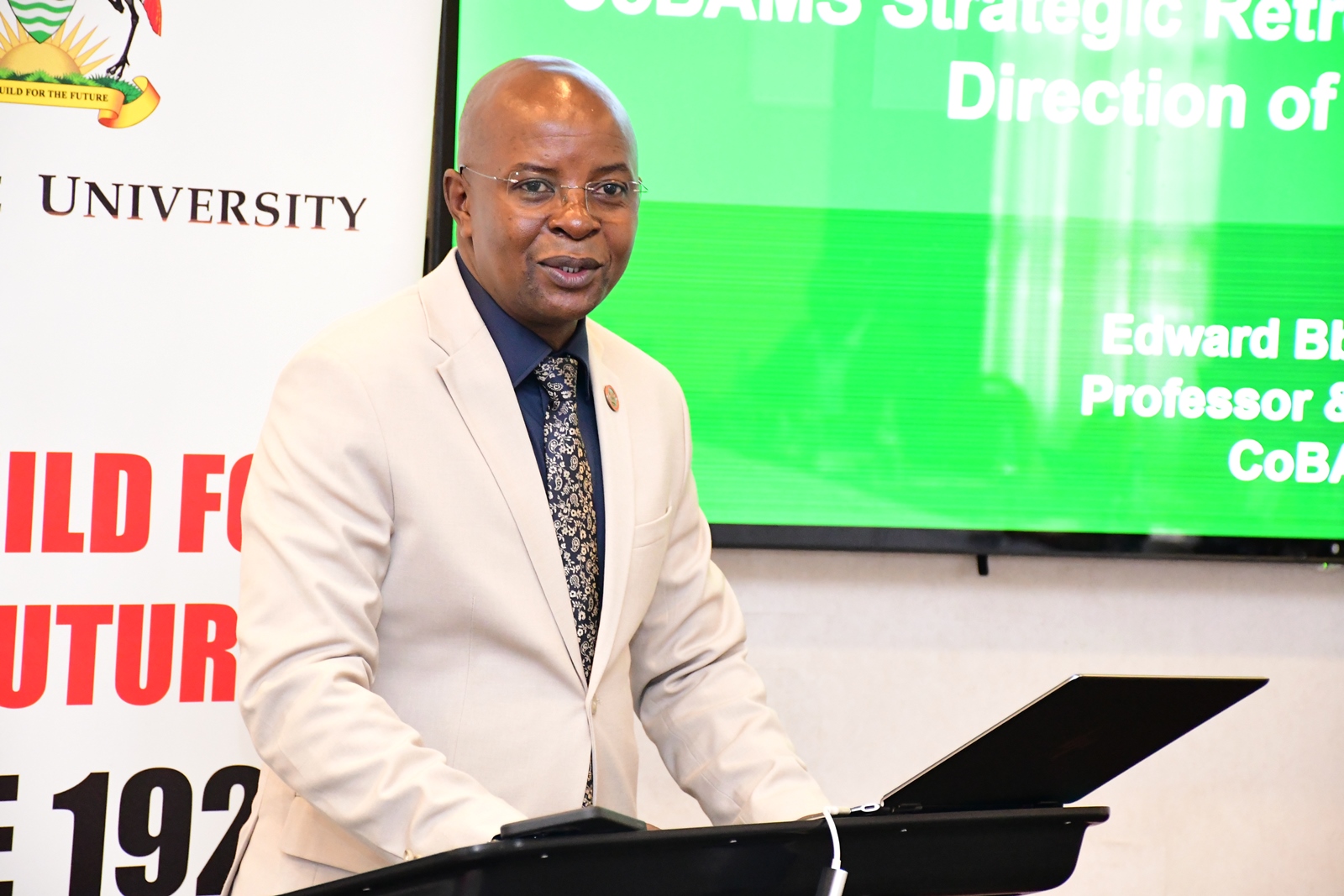
Through its strategic plan, Makerere University commits to being a research driven institution. This presents the ten (10) colleges at Makerere University with a golden opportunity to tap into the vast knowledge and rich experience of its qualified and experienced staff to contribute to the realization of the University’s research agenda.
Consequently, the College of Business and Management Sciences (CoBAMS) led by the Principal, Prof. Edward Bbaale organized a two-day strategic planning retreat bringing on board a representative sample of staff classified as the College management team to critically discuss the research direction of the college and come up with strategies aligned to the Makerere University strategic plan.
The two-day strategic planning retreat (10th to 11th April 2025) involved highly interactive sessions with seasoned facilitators namely the Principal-Prof. Edward Bbaale, the Deputy Principal-Prof. James Wokadala, the Director of Graduate Training-Dr. Julius Kikooma, the Head of Grants Administration and Management Support Unit (GAMSU)-Prof. Sylvia A.N. Nannyonga-Tamusuza and the Director of Quality Assurance-Dr. Cyprian Misinde. It was moderated by Ms. Ritah Namisango and Mr. Peter Mubiru, who are members of the CoBAMS management team.
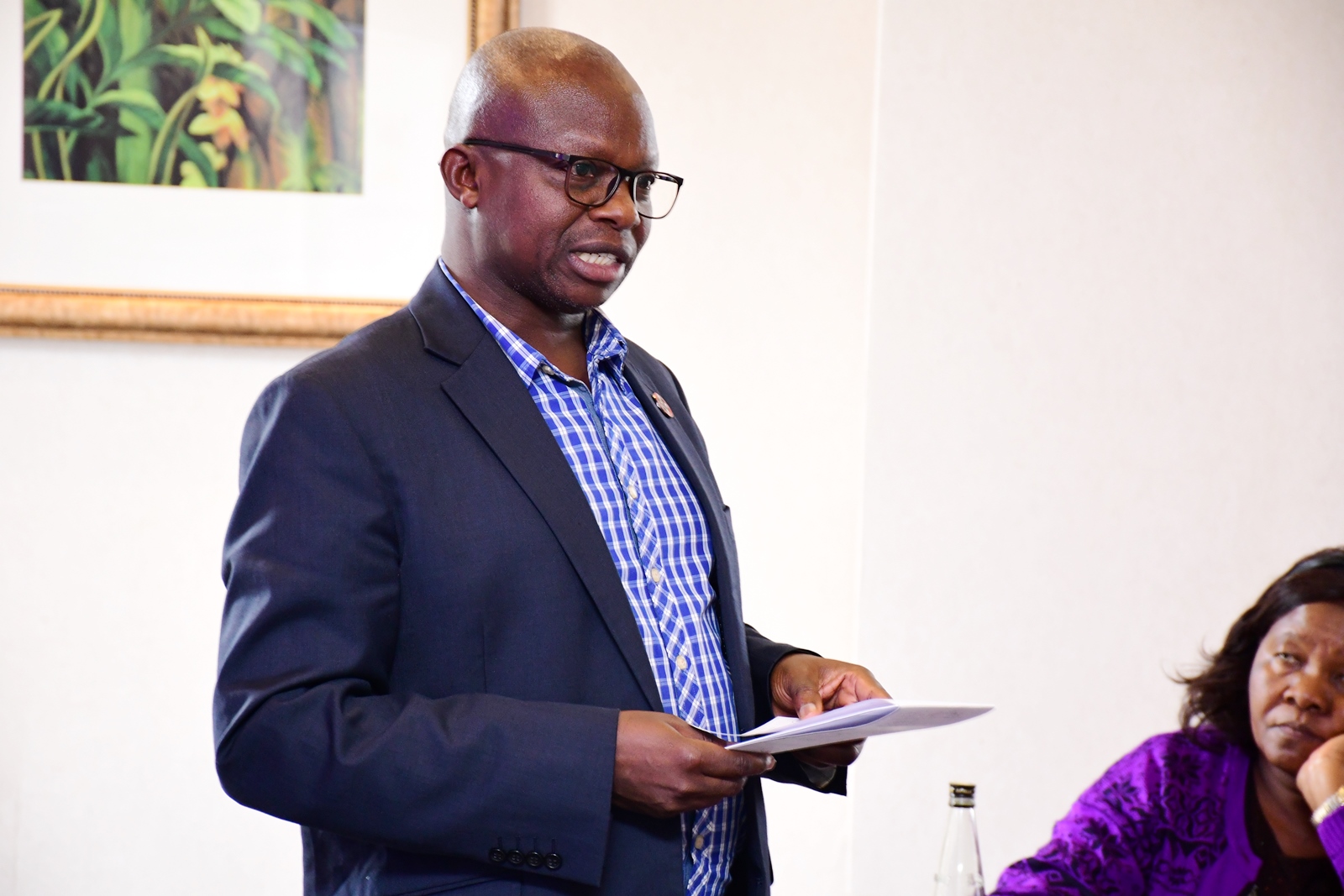
The presentations featured the College Strategic direction, the College Quality Assurance Framework, the Strategic direction of Makerere University on graduate training, Grants Management and harnessing the power of the College and members of staff to attract and win grants. In addition, the retreat provided a forum to discuss other critical functions such as innovative teaching and learning, internationalization, community engagements, knowledge transfer partnerships and networking.
Welcoming the participants, Prof. Edward Bbaale emphasized that the strategic planning retreat provided a pivotal platform to shape the future of the college. He stated that as Makerere University implements its research-driven agenda, CoBAMS will play a central role through prioritization of research and graduate training, internationalization, and provision of innovative teaching and learning.
He informed the College management team to embrace an approach that positions the students at the centre of research and the various activities undertaken by the College.
“The best way to propel CoBAMS is by working with students. A student with a good Masters’ degree dissertation should be supported through mentorship to publish his or her work,” he said.
Strategic and research direction of the College
Prof. Bbaale guided that every member of faculty should focus on increasing graduate student enrolment and knowledge production. Referring to well researched data, Prof. Bbaale reported that graduate students account for only 12% of the enrollment. He noted that the goal was to ensure that graduate students constitute 30% of the total enrollment by 2030. He rallied members of staff to work together to increase the number of graduate students both at Masters’ and PhD levels. He implored staff to effectively supervise graduate students so that they complete on time. He encouraged staff to involve graduate students in research projects, grant writing and joint publications. He noted the need to profile and follow up the graduate students.
Convinced about the strong correlation between research output and the number of PhDs, Prof. Bbaale urged staff to increase the number of PhD students. For instance, the taught PhDs in Economics, Finance, and in Statistics will significantly contribute to increased enrollment,” he said.
“Central to this is stabilizing graduate output and ensuring consistent PhD supervision. The structured PhD by research program and the taught PhDs if managed well will significantly increase the number of graduate student enrollment,” he added.
In this regard, Prof. Bbaale congratulated the Units under the College of Business and Management Sciences namely the School of Business, the School of Economics, and the School of Statistics and Planning for coming up with the option of taught PhDs.
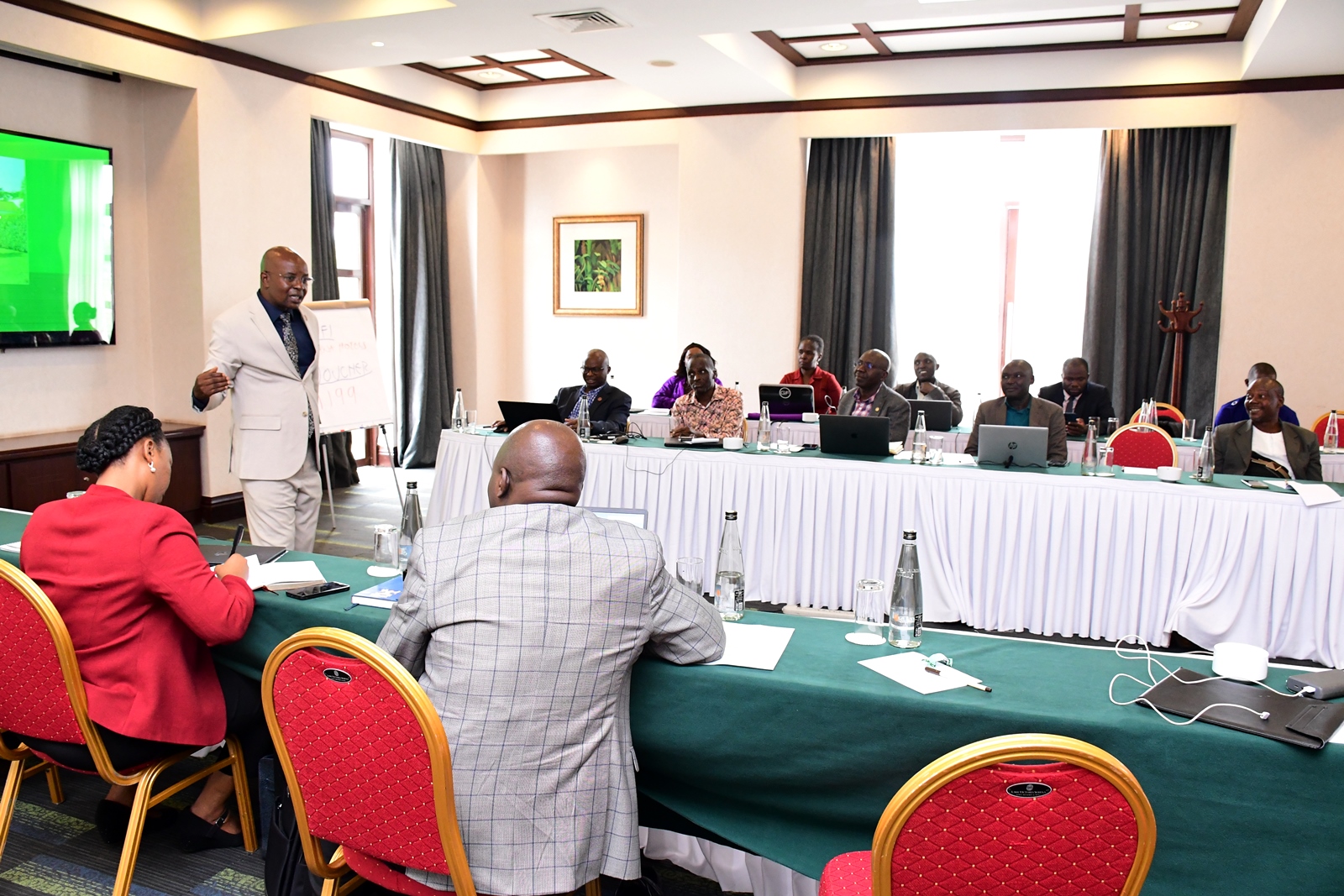
On the issue of timely completion of graduate programmes, he advised the faculty members to ensure that the students present vivas in January, February or March.
In addition, the crucial role of graduate coordinators and the college doctoral forum, convened by Dr. Kassim Sendawula, in nurturing a sense of community and providing support for Ph.D. students was emphasized.
Providing direction on research centres, he demystified the concept of thinking that one requires a physical building or large space to come up with a research centre. Prof. Bbaale encouraged faculty members to network and form research centres. “A centre is a team of researchers with like minds, passion and expertise in a particular area/field. For instance, Members of staff in the College of Business and Management Sciences could establish a Centre of Excellence in Tax Advisory.”
He explained the need to translate research into products that can be sold. He commended the ongoing initiatives by the College such as the Entrepreneurship Congress, and the Makerere University Innovation Pod. He called upon staff in CoBAMS to work with the Makerere University Innovation Pod, which is headed by a faculty member-Dr. Cathy Mbidde.
On the issue of internationalization, the Principal called for more collaborations with internationally recognized and reputable universities, bodies and research centres. He advised staff to actively participate in Erasmus mobility programmes and to implement collaborations that provide for staff and student exchange programmes.
In addition to acquiring degree qualifications from Makerere University, he advised the teaching staff to take a bold step and attain academic qualifications from internationally recognized institutions in other countries/continents.
“As a member of faculty, if your undergraduate degree or Masters’ was awarded by Makerere University, it is important that you secure your PhD from another internationally recognized university. This presents you with a rich and wider perspective as an academic, distinct advantage, exposure and access to other networks,” he guided.
Tackling the financial sustainability of the College, the Principal explained the need to establish special programs to operate as projects for example short courses leveraging the Council’s sharing ratio of 20:80, lobbying the University Management for more funding, mobilizing the college alumni, growing the College Endowment Fund, enhancing grant writing through GAMSU support and strengthening the College’s IRB.
Quality Assurance in teaching and learning processes
In his presentation, Dr. Cyprian Misinde focused on the standards and guidelines that should be followed by staff to safeguard the quality of processes at Makerere University.
Dr. Misinde re-affirmed the need for the CoBAMS teaching staff to scale up their research potential and outputs, actively participate in capacity building programmes, and above all, to continue to publish their research or work in internationally recognized journals.
He articulated the need to uphold the provision of high quality academic programmes through curriculum reviews, peer reviews, involvement of the private sector and industry, and following national and international accreditation procedures.
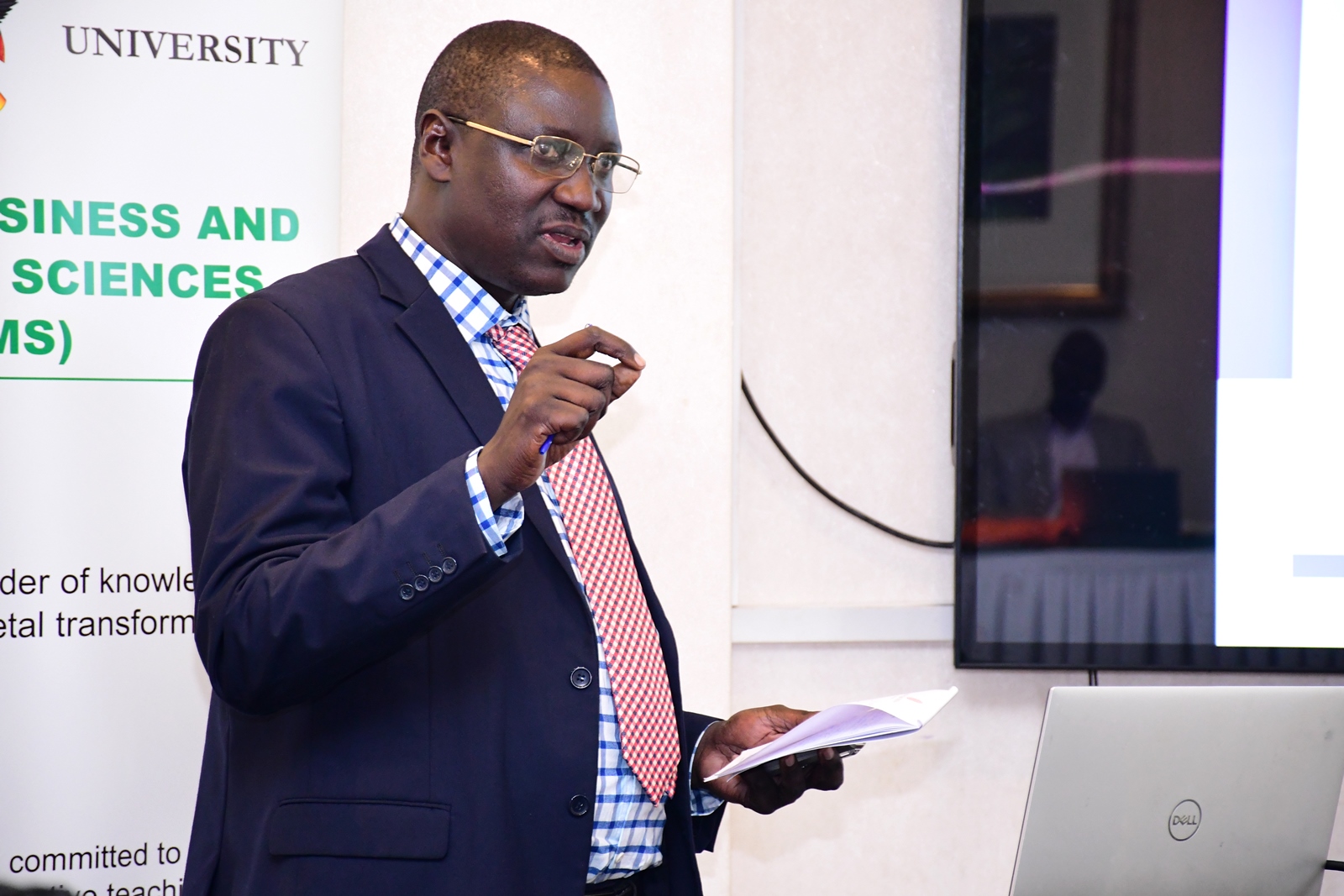
Dr. Misinde equally stressed the need for academic staff and heads of the respective departments to understand the accreditation steps and requirements and strictly adhere to the procedures. This, he added, will enable the Schools and Colleges to submit the academic programmes for accreditation to the Academic Registrar, Directorate of Quality Assurance and the University Senate within the expected timelines.
To enhance the effectiveness of instruction, he encouraged the teaching staff to adhere to fulfilling the minimum teaching load as per the University policy, reinforcing the commitment to delivering quality education.
On the management of students’ results, Dr. Misinde appealed to the teaching staff to mark the students’ scripts within the stipulated timeline. He reminded the teaching staff to adhere to the centralized marking processes at the College or School levels. He advised the College leadership to always invite the Student leaders or representatives to witness the centralized marking processes in order to build trust and transparency at all levels.
He informed participants about the independent student-staff assessment/evaluation tools that are administered by the Quality Assurance Directorate. These, Dr. Misinde clarified, present an opportunity to the students to assess their respective teachers/lecturers. He stated that these evaluations are essential for fostering educational quality and enriching the overall student experience. He disclosed that the feedback gathered from these assessments not only informs curriculum development but also identifies areas that require improvement in teaching methodologies, aligning with the university’s strategic objectives.
Graduate training at Makerere University
Building on the call to action by Prof. Edward Bbaale to the teaching staff to actively participate in critical processes aimed at increasing the number of graduate students, Dr. Julius Kikooma’s presentation centred on sensitizing staff on their obligations in the realization of that dream.
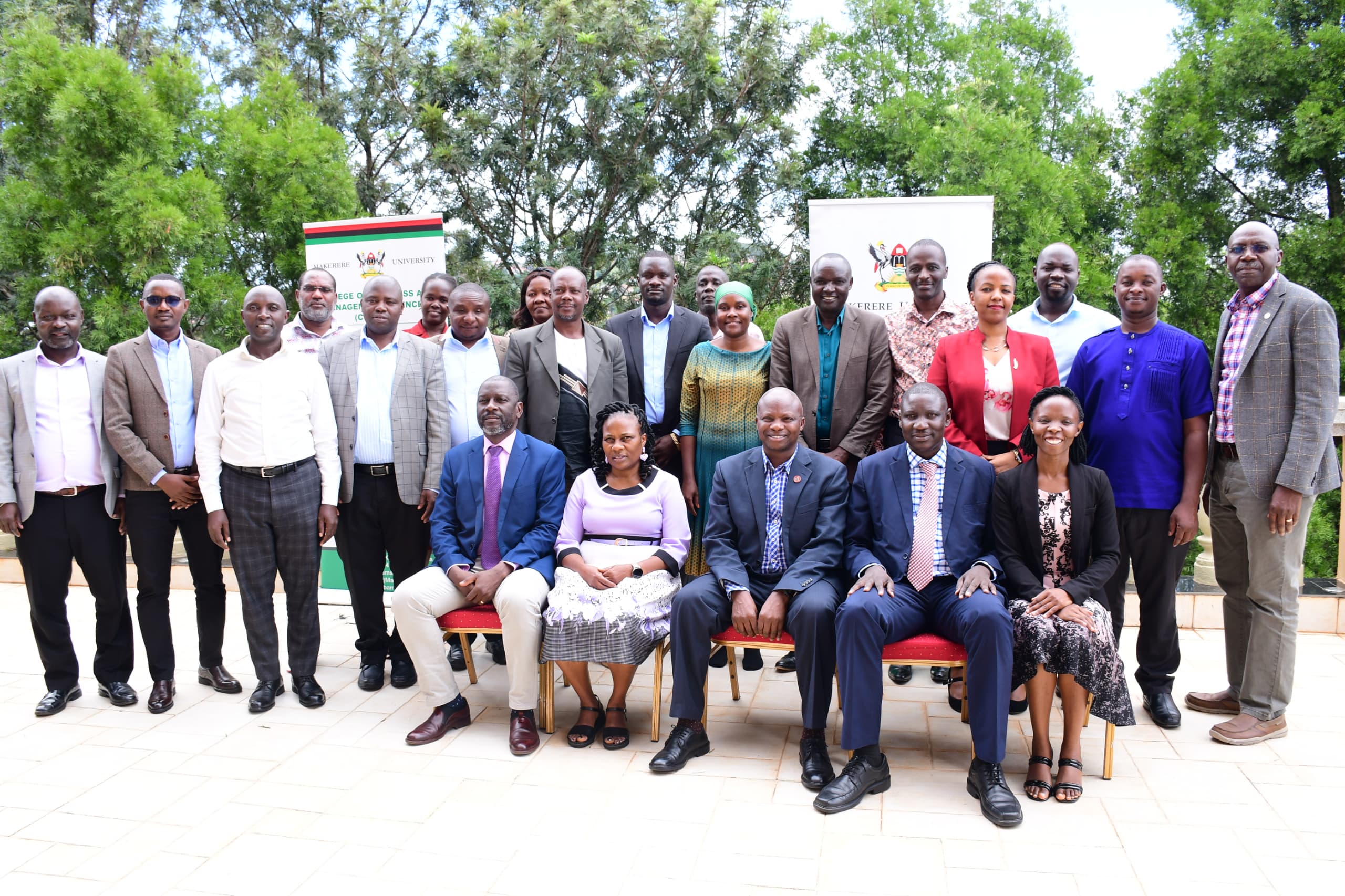
He outlined the Makerere University graduate policies, framework for structured PhD by research, graduate supervision and mentorship, digitization of the graduate training processes through the Digital Research Information Management System (RIMS), strengthening the capacity and commitment of human resources to drive the research-led agenda, elements of the Makerere University Graduate research strategy, teaching of PhD cross cutting courses, among other key factors.
Dr. Kikooma called upon Deans, Heads of Departments, Supervisors of Graduate Progammes and Registrars at CoBAMS to participate in the training on RIMS scheduled to take place on 21st April 2025.
Grants Administration and Management at Makerere University
In her presentation, Prof. Sylvia A. N. Nannyonga-Tamusuza reported that funds received through grants significantly contribute to building the research profile of the University, calling upon, Colleges to implement strategies aimed at attracting and winning research grants at the national and global levels.
She explained the need to professionally manage the research grants, requesting those entrusted to adhere to the terms and conditions specified in the guidelines or contract.
She observed that whereas it is mandatory to close out a grant/project, some entities do not, which is a great omission. She urged the faculty members and researchers to follow the guidelines stipulated during the grant application and award processes.
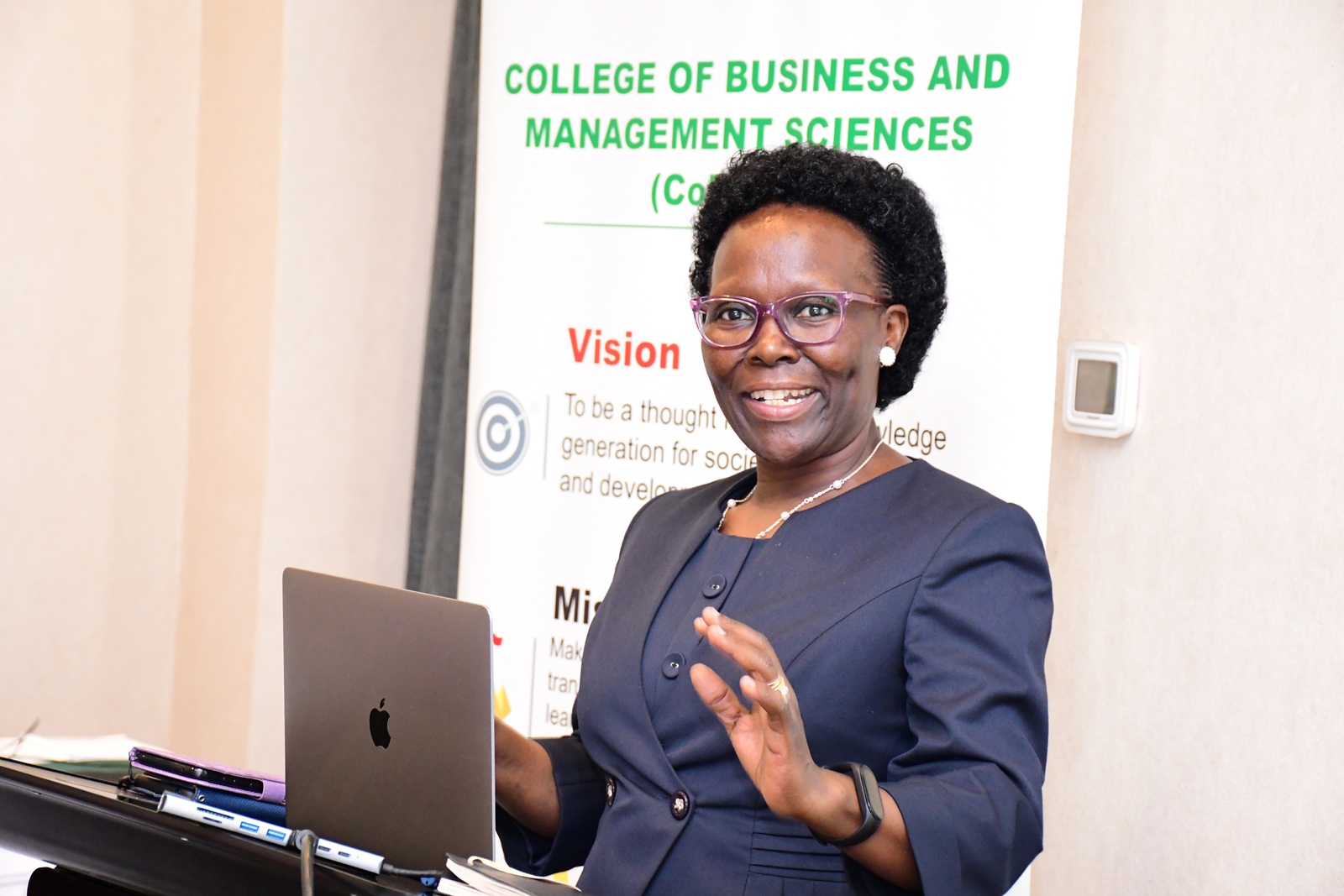
The Head of GAMSU emphasized the need to form research teams. “We have different abilities and skills. Through teams, we leverage our strengths. It also encompasses the multi-disciplinary approach,” she said. Underscoring the role of negotiation and interpersonal relations, she recommended training of researchers to engage with international partners.
She re-affirmed the necessity for proper documentation, transparency and accountability for funds. She reminded Principal Investigators, researchers and staff in general that research grant money is received on behalf of the institution, and not individuals. Thus, GAMSU expects to receive quarterly reports on grants. She explained that whereas some units could have designated a researcher or a member of staff to manage grants, when following up reporting and accountability for such funds, GAMSU engages the College Principal and College Bursar/Accountant.
To continue onboarding staff on grant administration and management, Prof. Nannyonga-Tamusuza revealed that GAMSU would conduct an intensive three (3) day training for Accountants, Research Assistants and Staff who handle grants at the University.
Way Forward
The College leadership team was tasked to lobby management to have an institutionalized mechanism for staff who mobilise resources for the University.
The College leadership team would schedule a specialized meeting with the University’s central management pertaining to research, funding, grant writing and execution, and graduate training among others.
Noting that members of staff play a vital role in the success of the college, the participants recommended prioritization of staff welfare focusing on health, sports, and morale.
Touched by the active participation and articulation of critical issues, the Principal committed to work with the College management team to ensure that the retreat bringing on board the College Management team is held twice a year.
Closing remarks
Prof. Wokadala commended the College management team members for participating in the retreat. “The retreat is one of the vehicles of creating a bond as the College management team. I am glad that we have discussed a number of critical issues that align with the strategic direction of the University,” said the Deputy Principal.
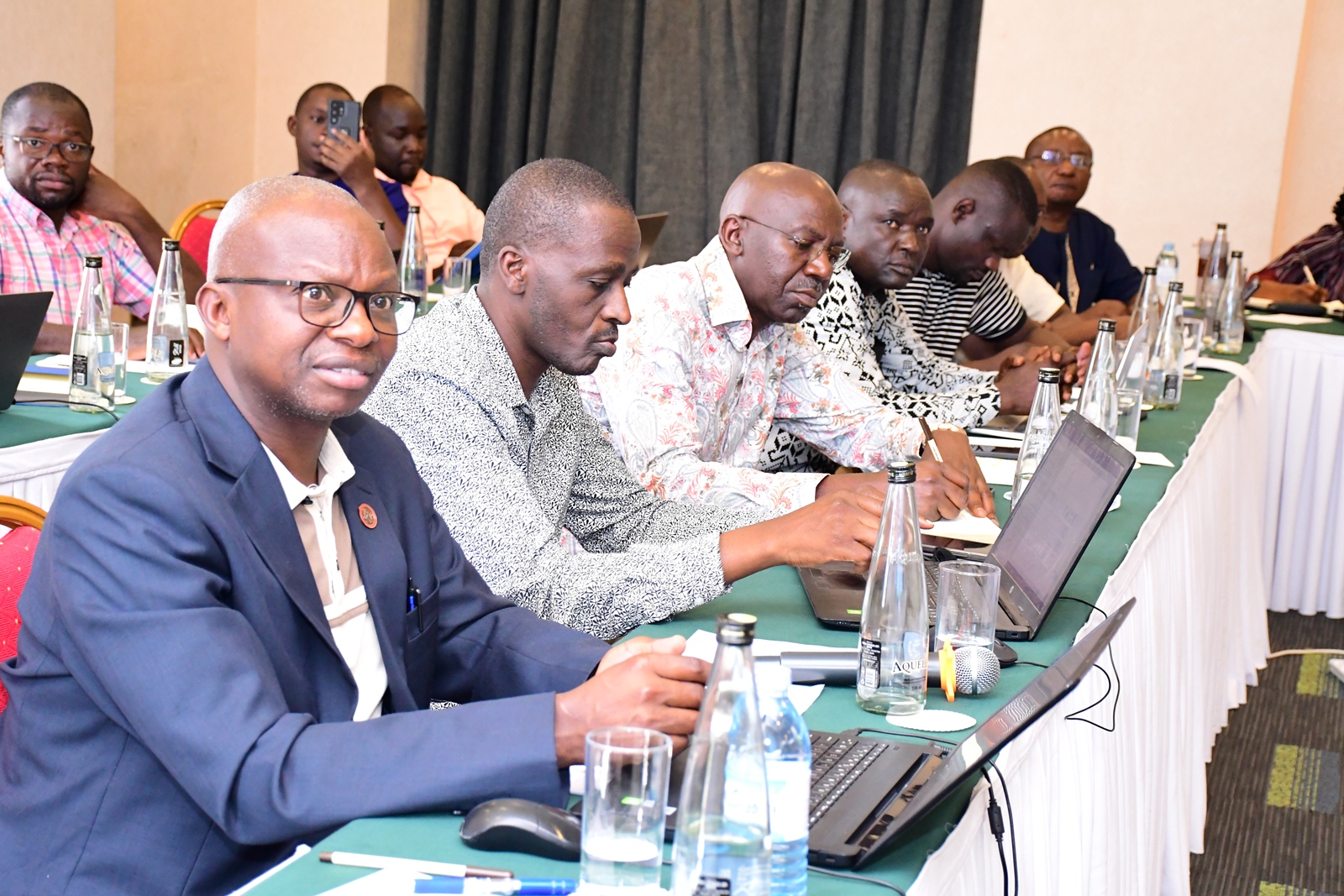
Prof. Bbaale thanked the organizing team and participants, urging them to reflect on the discussions and implement agreed-upon actions to improve the college for the benefit of its stakeholders, including students and the broader community. He also pointed out the need for the next retreat to focus on aligning the College’s strategy with the National Development Plan 4 (NDP4), ensuring its relevance and contribution to national development goals.
You may like
-
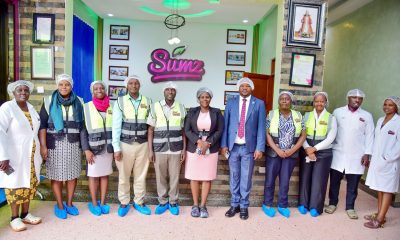

Makerere Explores Strategic Industry Partnership with Psalms Food Industries to Strengthen Manufacturing Innovation
-
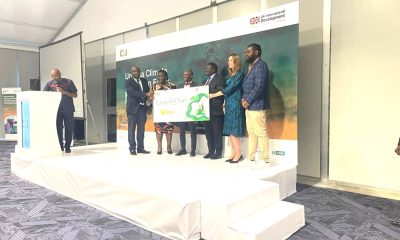

Makerere University Researchers Awarded UCIF Grant to Tackle Maize Contamination with Innovative Plant-Based Fungicide
-


Mak News Magazine: February 2026
-
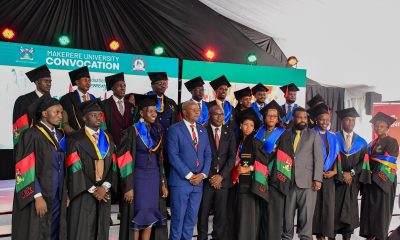

76th Graduation Ceremony: CoBAMS Staff and Graduates Win Excellence Awards
-


Celebrating Academic Excellence: CoBAMS Presents 975 Graduands at Mak 76th Graduation Ceremony
-


76th Graduation Highlights
Business & Management
Thirty Public Officers Certified in Integrated Regulatory Cost-Benefit Analysis
Published
2 days agoon
March 3, 2026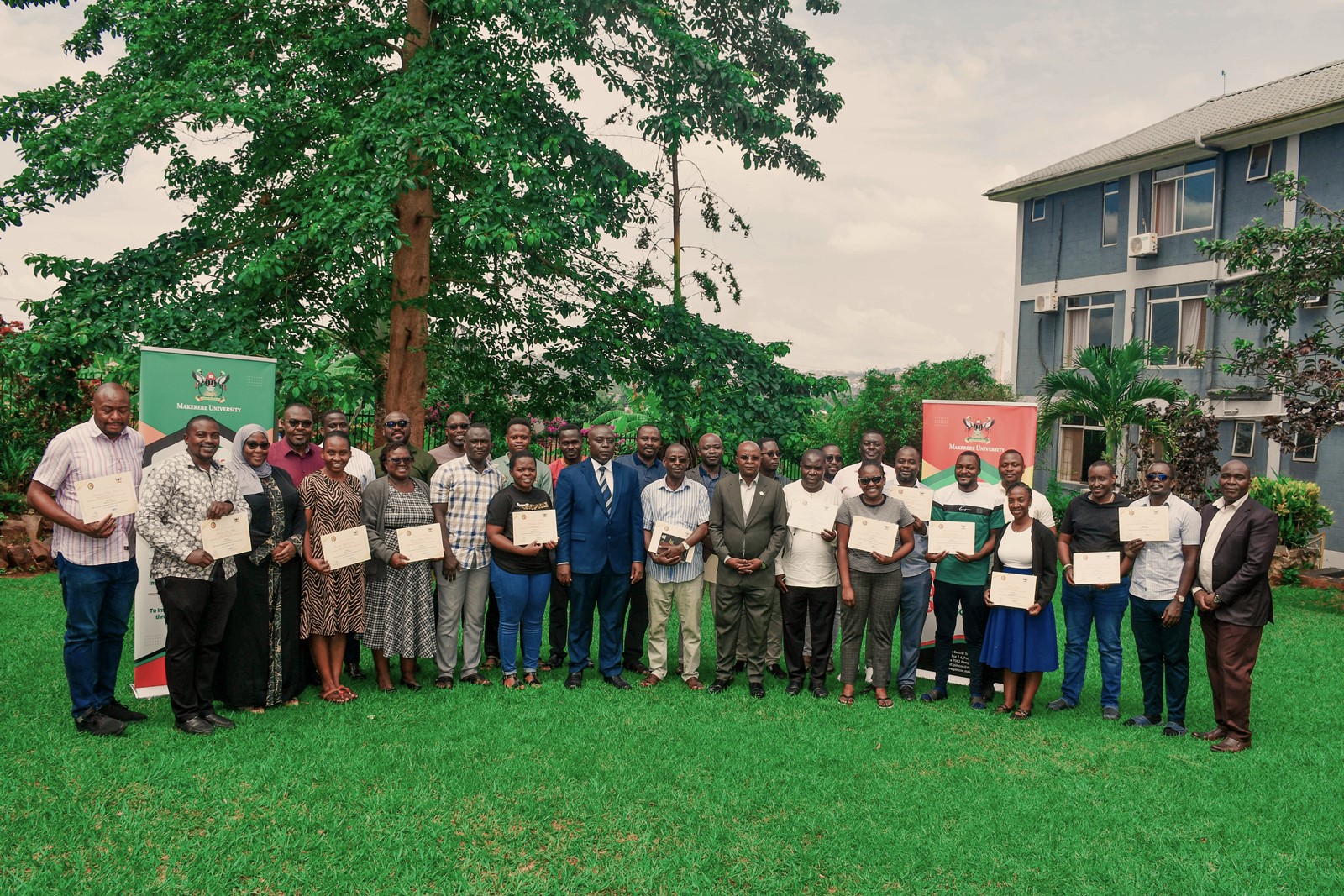
Thirty public officers from various Ministries, Departments and Agencies (MDAs) have successfully completed a two-week intensive training in Integrated Regulatory Cost-Benefit Analysis (IRCBA), culminating in the award of certificates at a closing ceremony held on 27th February 2026 at the Pearl on the Nile Hotel in Jinja.
The training was jointly organized by the Public Investment Management Centre of Excellence at Makerere University and the Ministry of Finance, Planning and Economic Development (MoFPED), in collaboration with the Infrastructure and Social Services Department (ISSD) and the National Planning Authority (NPA). It focused on operationalizing the Revised Guidelines for the Issuance of Certificates of Financial Implication (CFIs), which came into effect on 1st July 2025.
A Strategic Reform for Fiscal Credibility
In closing remarks delivered on by Commissioner Paul Patrick Mwanja behalf of the Permanent Secretary/Secretary to the Treasury, participants were commended for undertaking the training during a demanding budget cycle, when many MDAs are simultaneously preparing the FY 2026/27 Budget, executing the FY 2025/26 Budget, and implementing the National Development Plan IV and the Tenfold Growth Strategy.
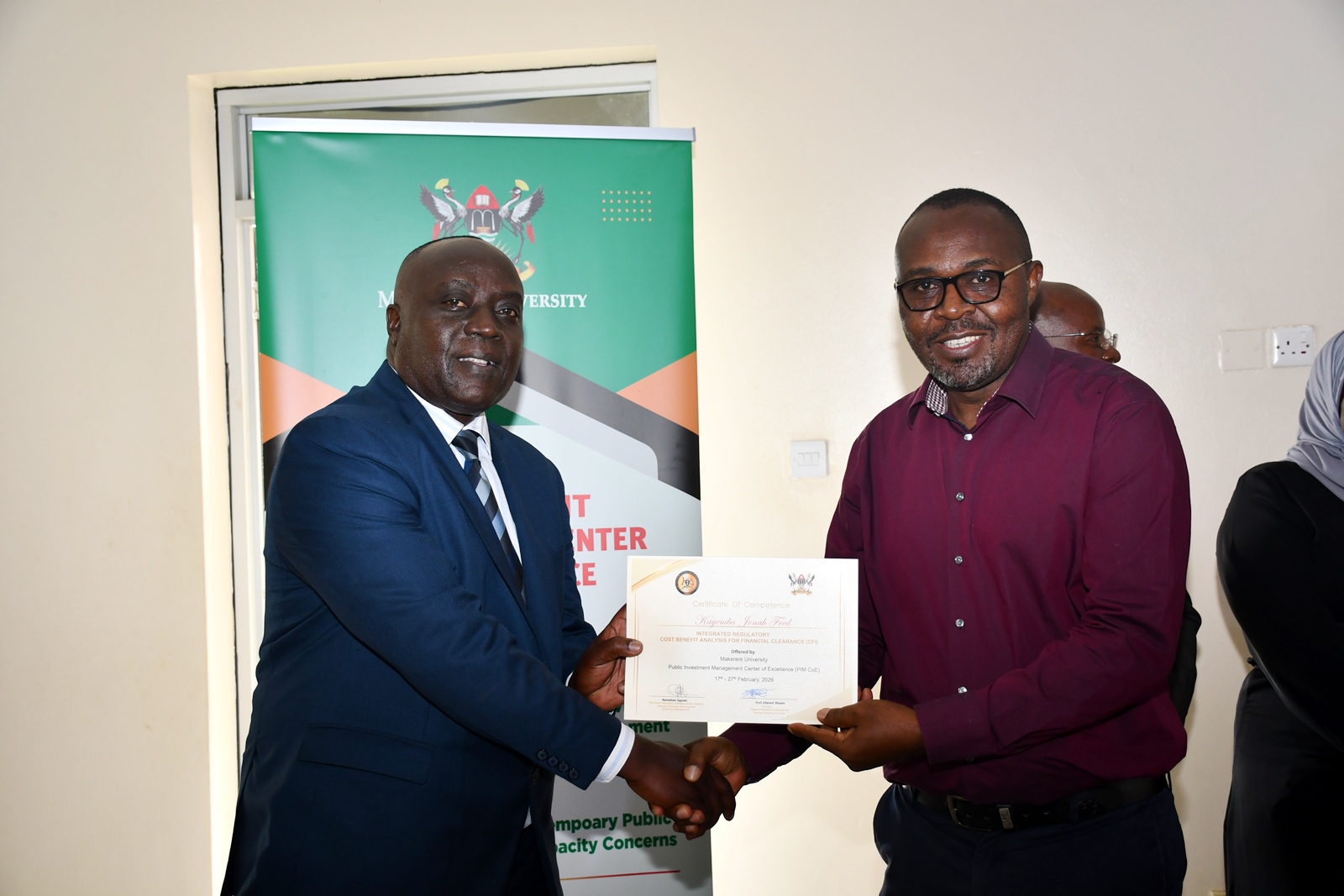
The PS/ST emphasized that the revised Guidelines mark a significant shift toward a more transparent, data-driven, consultative, and analytically rigorous approach to evaluating policy and legislative proposals. Participants were equipped to assess fiscal implications, evaluate economic and socio-economic impacts, analyze distributional effects, and address uncertainty using structured analytical tools.
They were reminded that training alone is not sufficient, the real test lies in consistent application. As members of the third cohort, they were challenged to serve as reform ambassadors, championing evidence-based policymaking and strengthening analytical standards across government.
Bridging Academia and Public Service
Delivering the official closing remarks, the Director of the PIM Centre of Excellence, Prof. Edward Bbaale, commended participants for their active engagement and unwavering commitment throughout the training.
He described the programme as both timely and strategic, designed to equip officers with practical tools to prepare robust Statements of Financial Implication (SFIs) that support credible issuance of CFIs. He noted that strong financial analysis enhances fiscal discipline, policy coherence, and the overall quality of legislation and public policy in Uganda.
Prof. Bbaale underscored the longstanding partnership between Makerere University and the Ministry of Finance, highlighting how it continues to bridge academia and public service by combining analytical rigor with practical policy experience. He emphasized that the collaborative model — bringing together faculty from the College of Business and Management Sciences and practitioners from Government, reflects the core vision of the PIM Centre of Excellence: strengthening national systems through evidence-based policymaking.
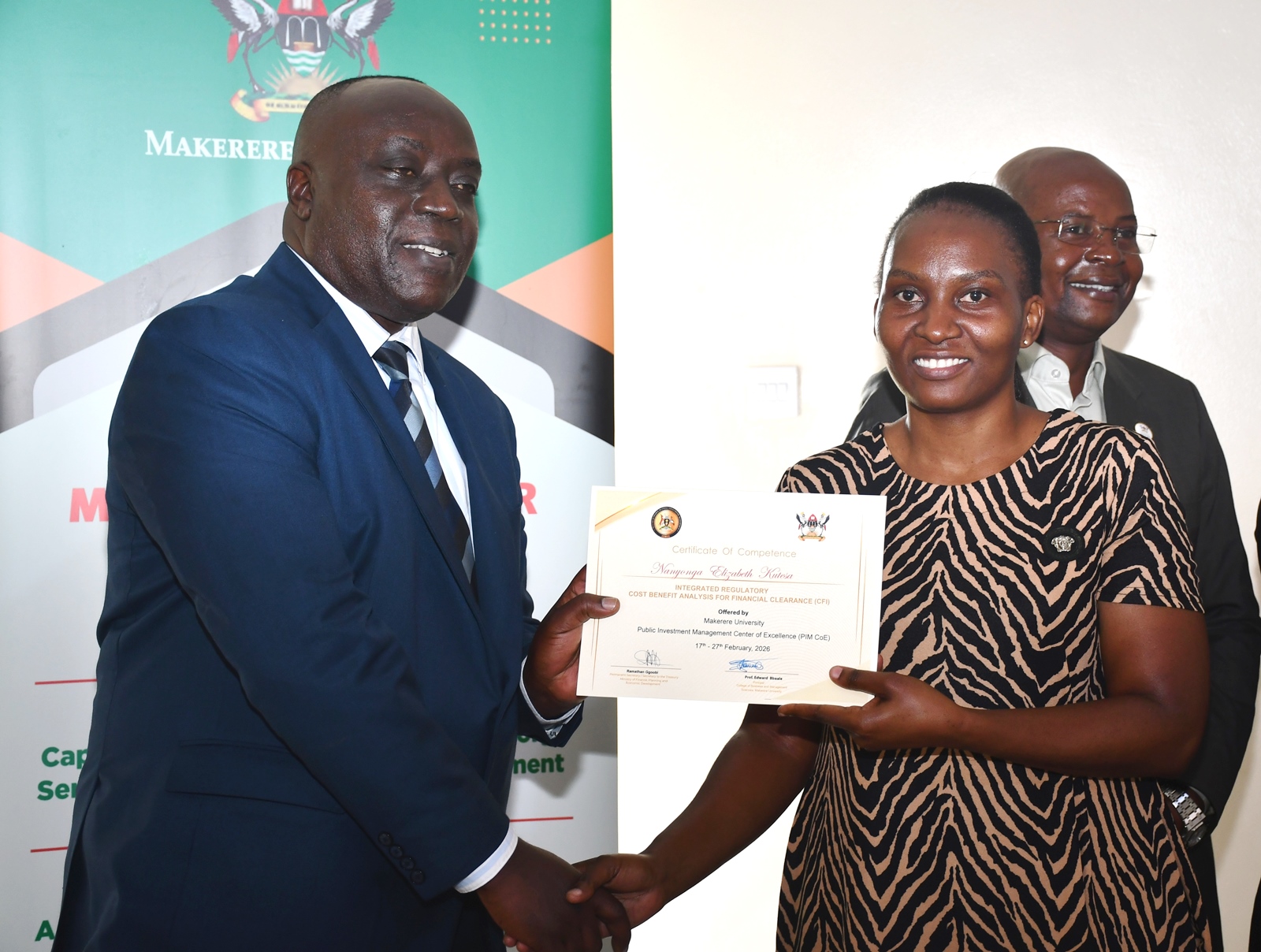
During the two weeks, participants gained hands-on experience in applying cost-benefit analysis across four critical dimensions: budgetary analysis, socio-economic analysis, distributive impacts, and risk assessment. Prof. Bbaale encouraged them to return to their institutions as agents of transformation, improving evaluation frameworks, strengthening regulatory decisions, and ensuring that public interventions deliver value for money and long-term development impact.
He also reaffirmed the Centre’s broader mandate beyond training, noting its recent support to the revision of Development Committee Guidelines, assessment of public investment performance since NDP I, and hosting of the Second Public Investment Management Conference in August 2025.”
Building from “Zero Kilometre”
Earlier, the Manager of the PIM Centre of Excellence highlighted the practical approach adopted during the training. Participants began with blank Excel sheets and built analytical models from scratch, likened to the engineering concept of starting at “zero kilometre,” where construction begins from the very starting point and progresses step by step.
The interactive sessions enabled participants from diverse disciplines, including policy analysts, planners and statisticians, to interrogate assumptions, refine costing approaches, and debate implementation and enforcement frameworks. Their sector-specific insights enriched the learning process and strengthened the analytical models developed.
The Manager noted that excellence is not about knowing everything, but about bringing together the right expertise. Facilitators from MoFPED, NPA, the Office of the President, and Makerere University ensured that theory remained grounded in practical government realities.
Participants Applaud Practical and Engaging Sessions
Speaking on behalf of the cohort, a participant described the training as highly engaging and transformative. The combination of theory and practical application, coupled with patient facilitation, allowed officers from varied professional backgrounds to learn from one another.
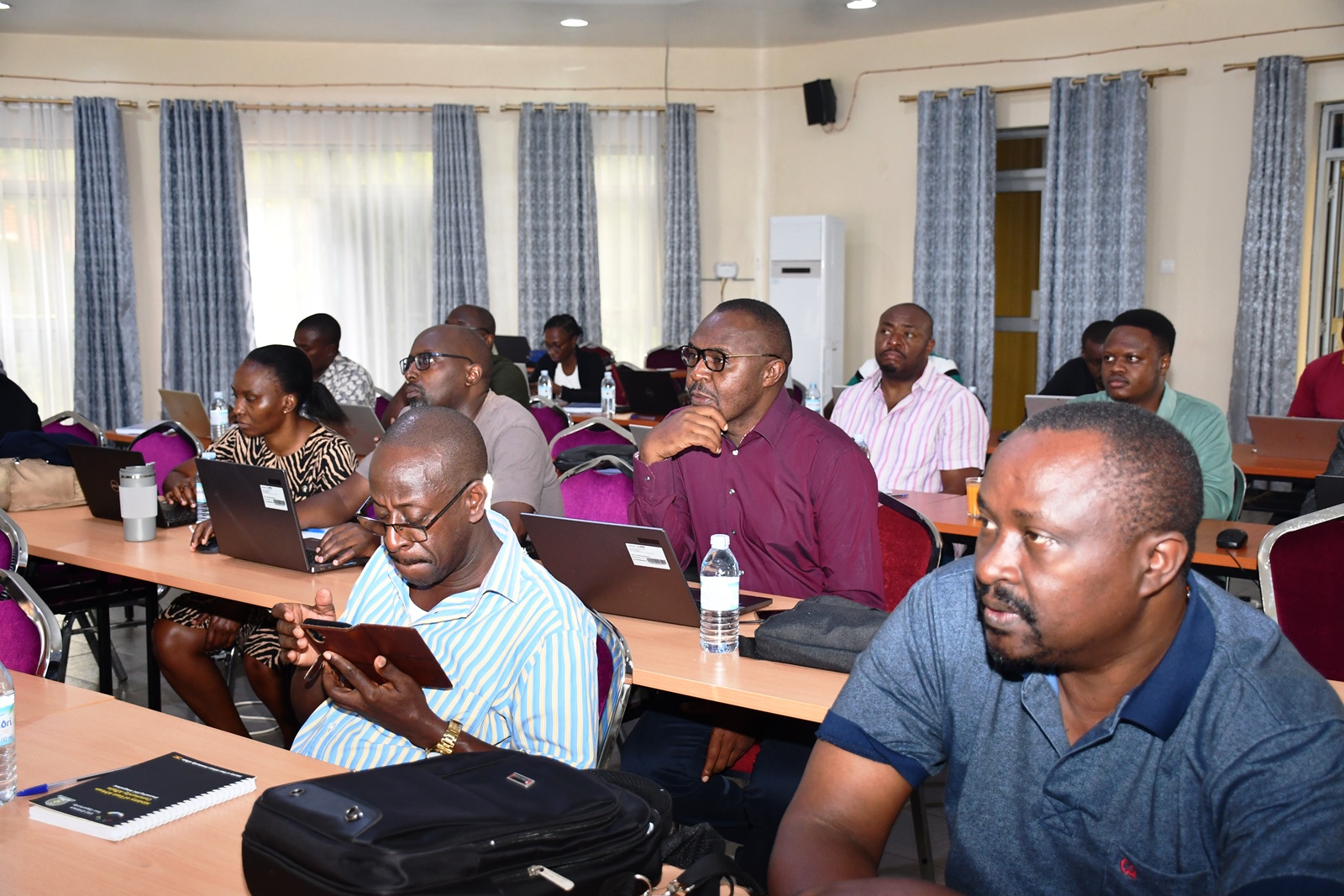
The participant highlighted the final day’s discussions as the most impactful, expressing confidence that the knowledge gained would enhance policy analysis and improve the quality of programmes and projects across MDAs.
Certificates Awarded
The ceremony concluded with the award of certificates to all 30 participants in recognition of their successful completion of the IRCBA training. The certification marks another milestone in Government’s effort to build a critical mass of experts capable of institutionalizing rigorous financial and economic analysis in public policy processes.
As the workshop was formally declared closed, participants were encouraged to apply their newly acquired skills consistently, mentor colleagues, and contribute to strengthening fiscal governance across Government.
The PIM Centre of Excellence reaffirmed its commitment to continuous research, policy advisory support, and capacity building as Uganda advances toward more credible, transparent, and sustainable public decision-making.
Business & Management
Botswana Delegation Visits Makerere’s Public Investment Management Centre to Study Sustainable Training Model
Published
2 days agoon
March 3, 2026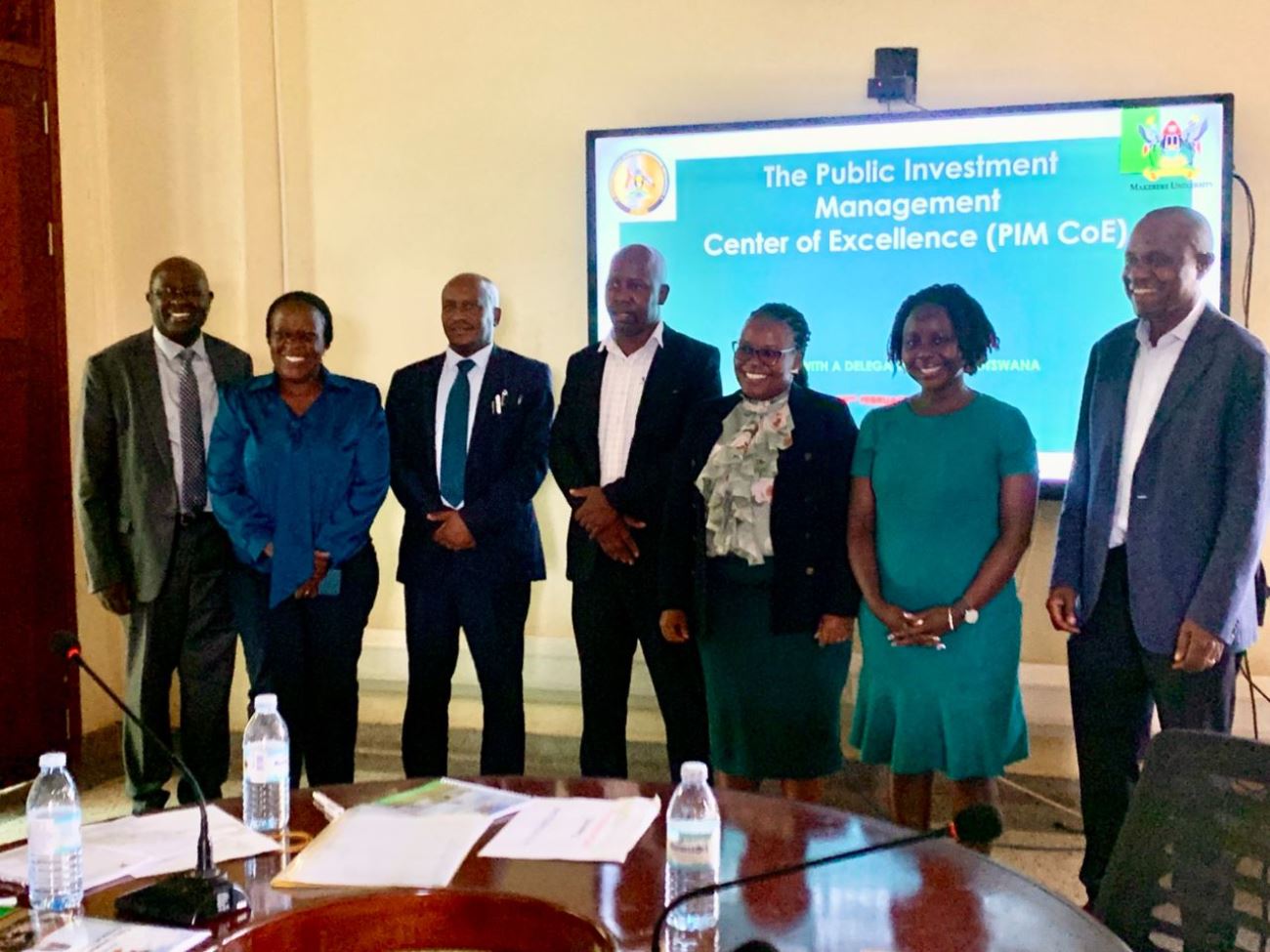
Kampala, Uganda – 25 February 2026
A delegation from Botswana’s public investments sector on 25th February 2026 visited Makerere University’s Public Investment Management Centre of Excellence to benchmark its sustainable training model and draw lessons from Uganda’s well-established Public Investment Management (PIM) framework.
The team, composed of specialists in public investments, is exploring ways to strengthen capacity within Botswana’s public sector institutions. The delegation underscored the importance of structured and sustainable capacity-building programmes, noting that effective public investment management is central to driving national development and ensuring value for money in public projects.
During the engagement, the Botswana team sought to understand the Centre’s operational model, including how it designs and delivers training programmes that remain impactful over time. Particular interest was placed on the Centre’s approach to sustainable training delivery, the documentation of challenges and successes, and mechanisms used to ensure that public officers acquire long-term, practical skills that translate into improved project planning, appraisal, and implementation.
The visiting delegation commended Uganda’s commitment to institutionalizing PIM training and emphasized that cross-country learning is vital for strengthening public financial management systems across Africa. They observed that Uganda’s experience offers practical insights into building a resilient and responsive PIM framework anchored in continuous professional development.
As part of their recommendations, the delegation proposed the introduction of a hybrid training model to enhance accessibility for international participants. Under this approach, the theoretical components of PIM courses would be delivered online, allowing participants to engage remotely from Botswana and other countries. This would then be followed by in-person sessions in Uganda focused on hands-on, experiential learning at the Centre.
According to the delegation, such a model would significantly reduce travel costs and time while preserving the value of face-to-face practical training. The hybrid approach would also provide flexibility for busy public officers, enabling them to balance professional responsibilities with structured learning.
The visit further strengthened regional collaboration and reaffirmed the role of Uganda’s Public Investment Management Centre of Excellence as a hub for capacity development in public investment management across the continent.
Business & Management
76th Graduation Ceremony: CoBAMS Staff and Graduates Win Excellence Awards
Published
1 week agoon
February 26, 2026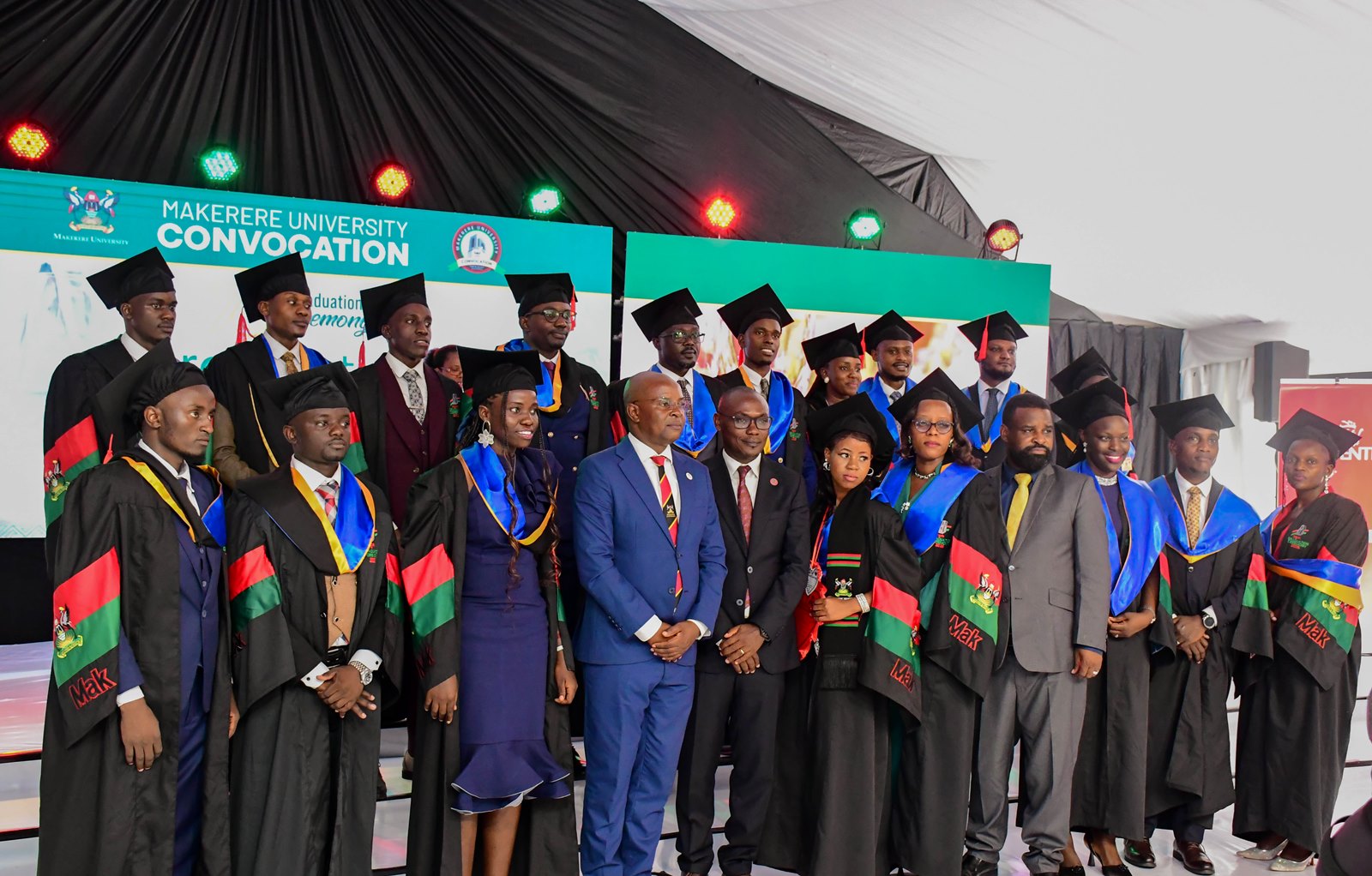
26th February 2026-During the 76th Graduation Ceremony (24th to 27th February 2026), Makerere University invoked its tradition of recognizing outstanding performance and excellence in academics, research, teaching, knowledge transfer, publication and authorship.
The College of Business and Management Sciences (CoBAMS) presented students for graduation on the third day of the 76th graduation ceremony. Consequently, on 26th February 2026, entities within the University namely the Office of the Vice Chancellor, Makerere University Press, the Directorate of Research, Innovations and Partnerships, Directorate of Graduate Training, and partners including the Economic Policy and Research Centre (EPRC), Association of Chartered Certified Accountants (ACCA Uganda), Prudential Uganda, lined up awards, to celebrate achievements and excellence.
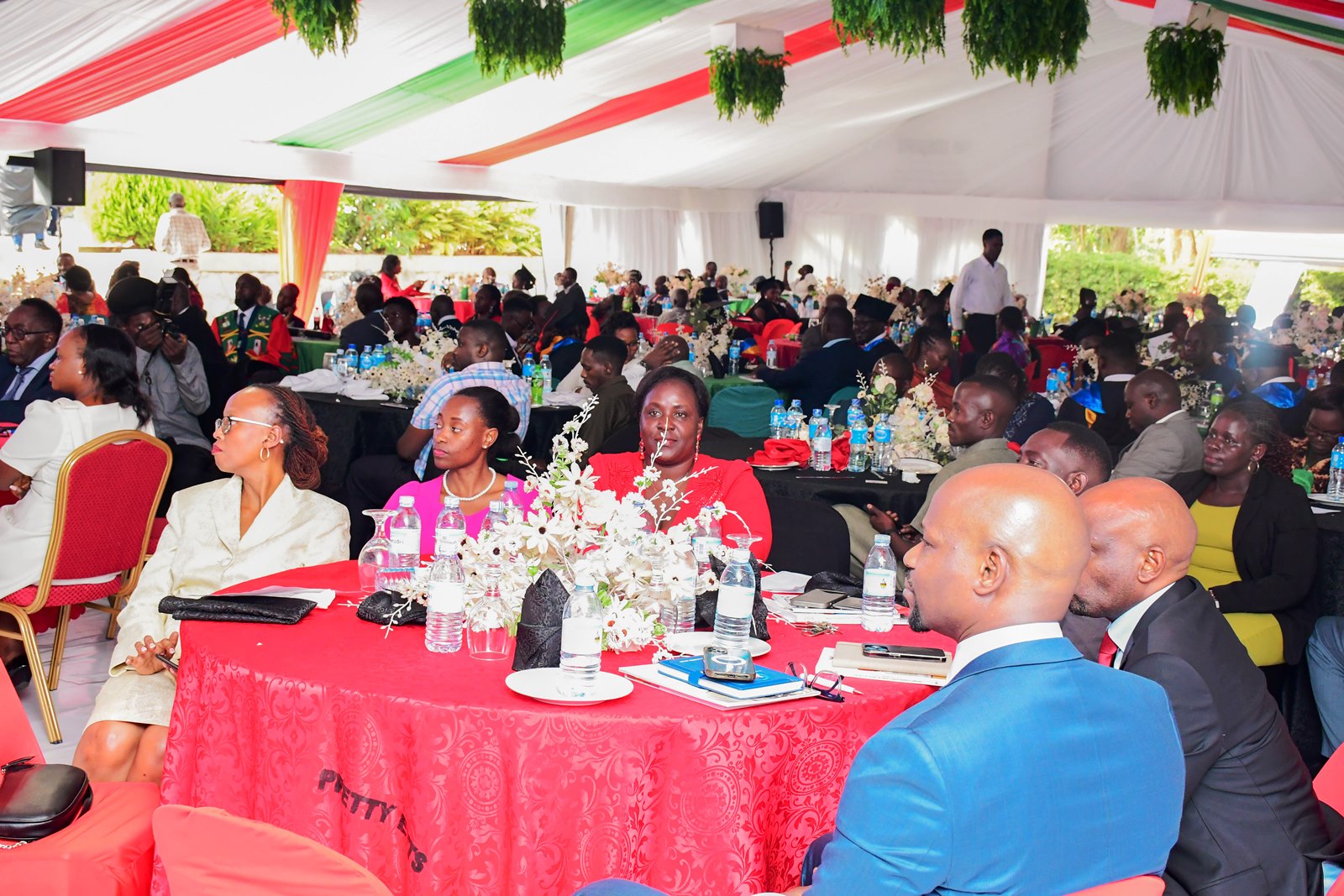
The award ceremony brought onboard invited guests from public and private sectors, the business community, Makerere University officials, faculty members, alumni, industry partners and graduating students. The awards were presented during the Makerere University Convocation Graduation Luncheon.
The ceremony provided a platform for celebrating academic excellence, strengthening alumni engagement, and reinforcing collaboration between the University and its professional and industry partners.
2026 Research Excellence Awards
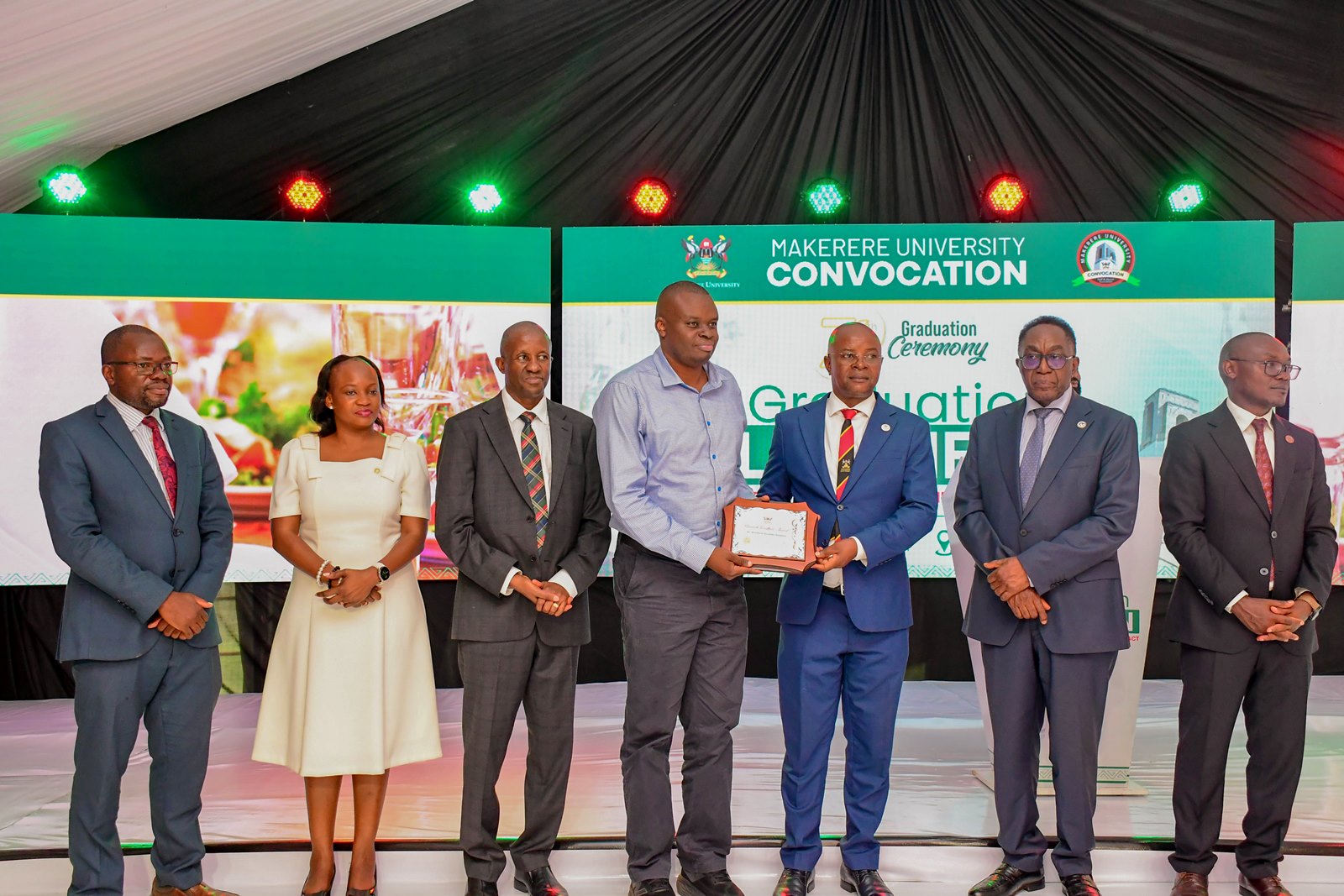
The Vice Chancellor’s Research Excellence Awards were presented to college members whose research output and scholarly contributions have significantly advanced knowledge and strengthened the College’s academic profile.
At CoBAMS, the recipients of the Vice Chancellor’s Research Excellence Awards in the various categories included the following:
- Associate Professor Faisal Buyinza, Overall top research award
- Associate Professor Faisal Buyinza, Senior-Career Research award
- Stephen Ojiambo Wandera, Mid-Career Research award
- Ruth Mpirirwe and Richard Ssempala, Early-Career Research award
The awardees were honored for their exceptional research productivity, impactful publications, and contribution to building a vibrant research culture.
The awards underscore Makerere University’s emphasis on high-quality research that addresses national and global development challenges.
Recognition of Book Author
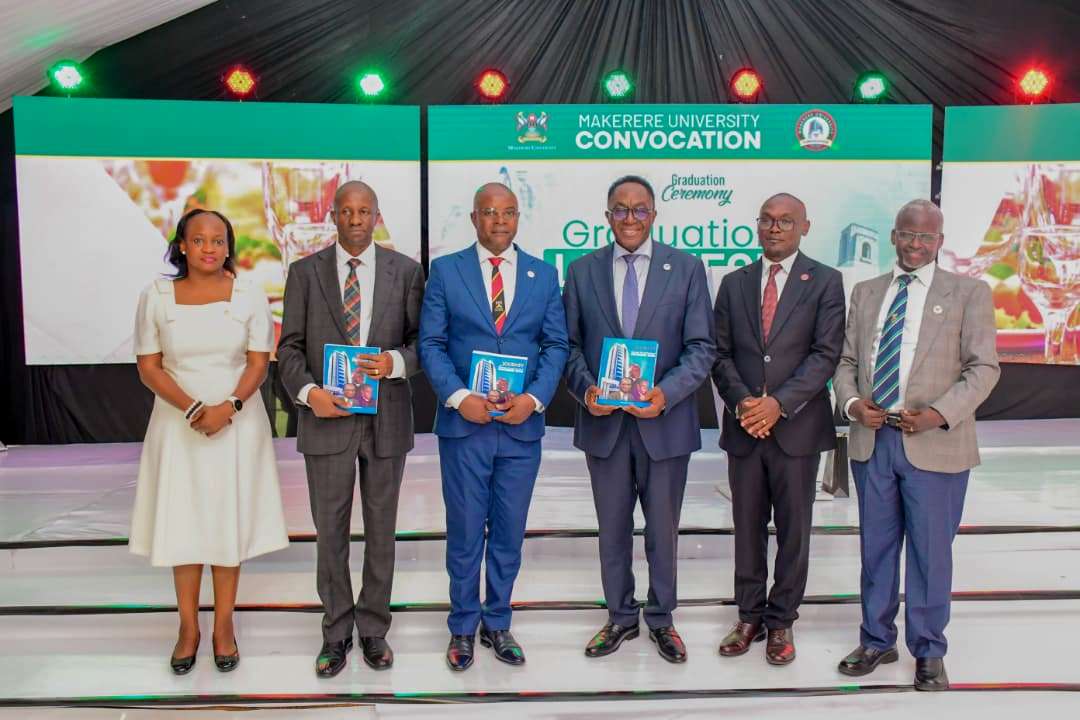
Prof. John Ddumba-Ssentamu, a renowned economist, administrator, former Vice Chancellor of Makerere University, and the pioneer Principal of the College of Business and Management Sciences, was honoured for his contribution to scholarship and knowledge transfer through authorship.
Published by Makerere University Press, Prof. Ddumba-Ssentamu’s book titled, The Journey: Beginnings, Trials and Triumphs of Centenary Bank, highlights the evolution, resilience, and growth of Centenary Bank and reflects his continued contribution to academic literature and thought leadership in the fields of economics and financial development.
Prof. Ddumba-Ssentamu’s recognition reflects the University’s appreciation of distinguished scholars whose published works contribute to intellectual discourse, policy engagement, and the advancement ofscholarship.
Reputable partners recognize excelling graduates
ACCA Uganda- Best Accounting Student
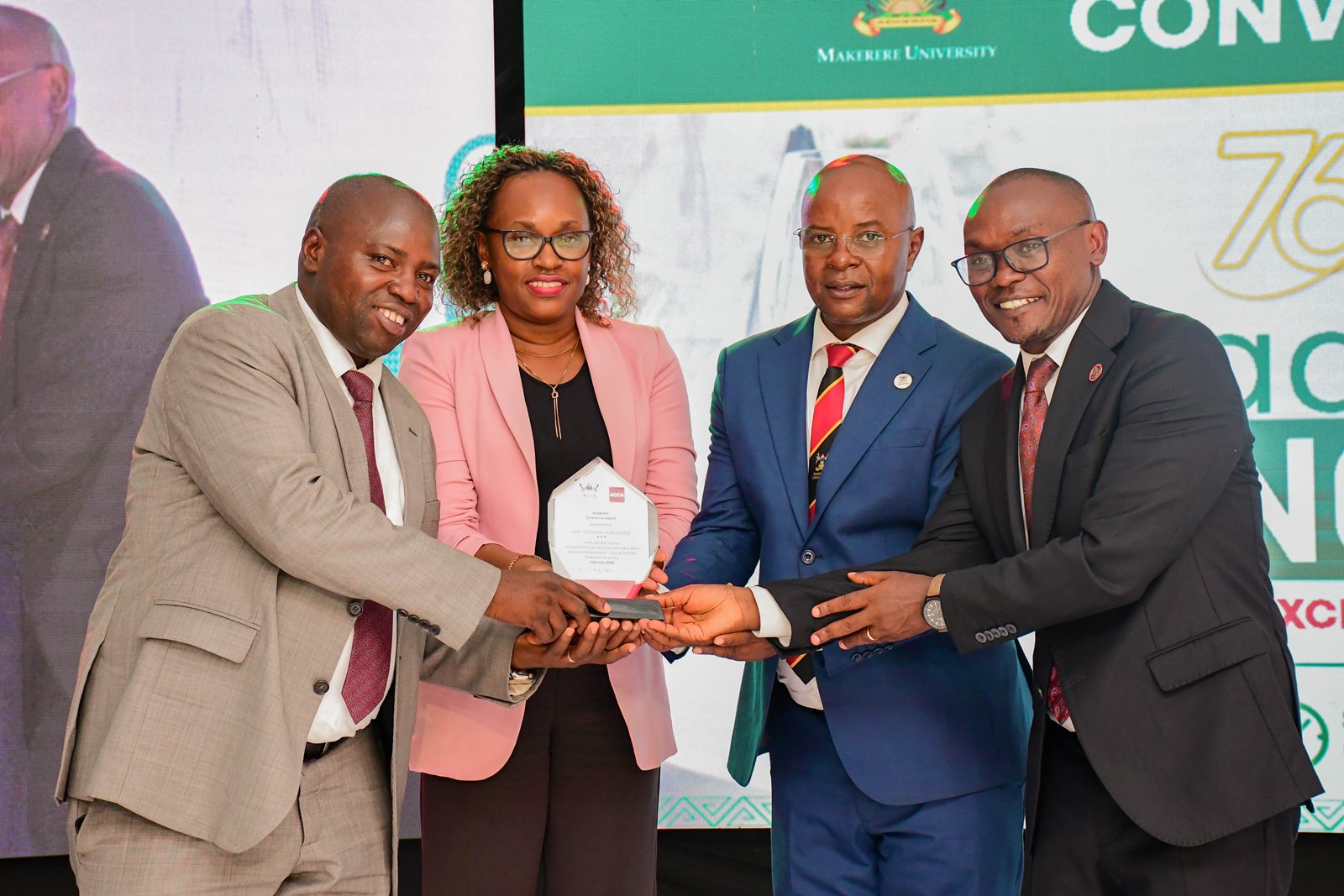
Prudential Uganda-Actuarial Science Award
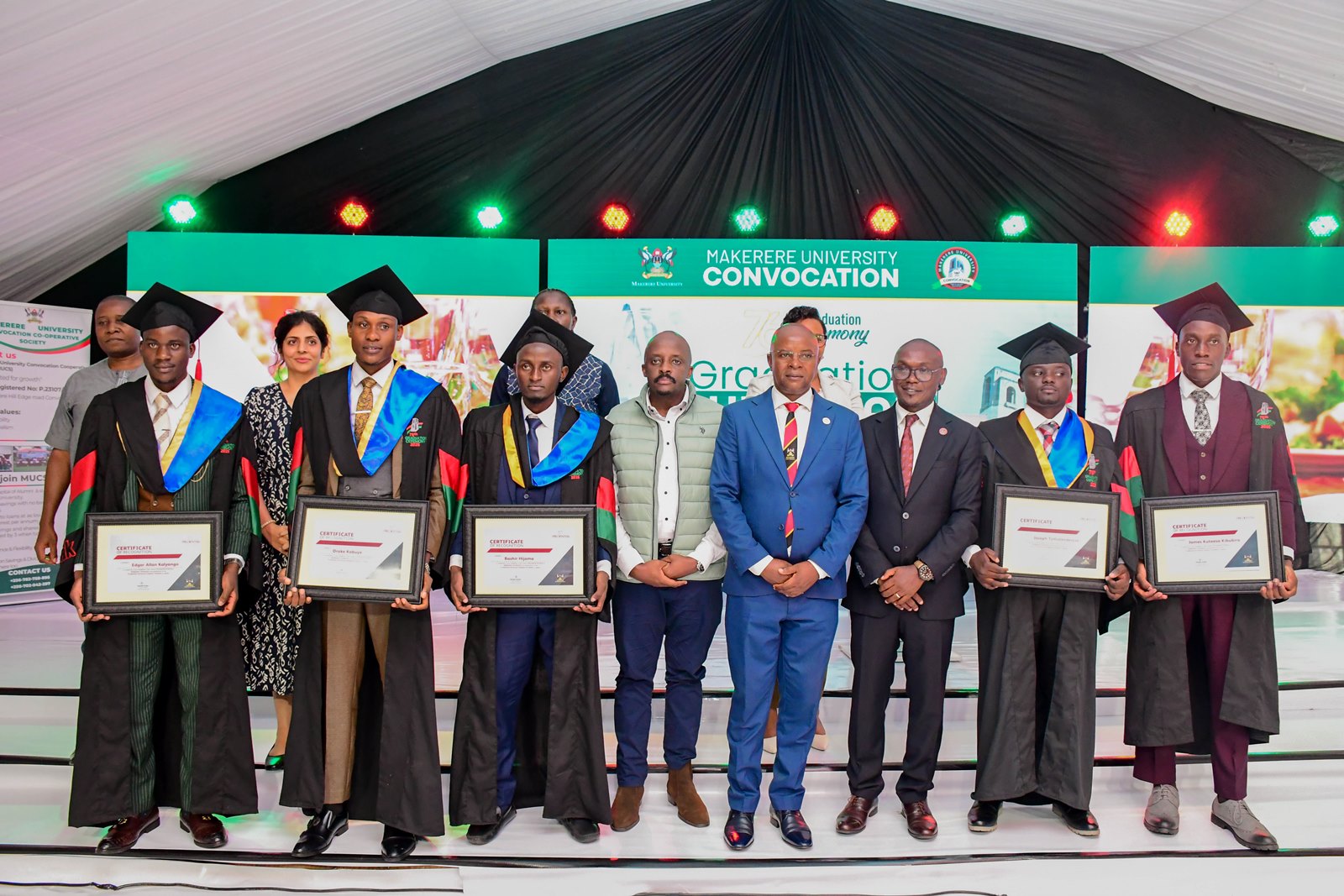
Celebrating academic excellence, Prudential Uganda recognized the fourth cohort of outstanding actuarial science graduates under the Prudential Actuarial Science Support Scheme (PASS). The initiative reflects Prudential’s long-term commitment to building local actuarial expertise and strengthening Uganda’s financial services sector for generations to come.
The top five graduates of Bachelor of Science in Actuarial Science who received the PASS awards included: Drake Kabuye, Edgar Allan Kalyango, Kuteesa Kikubira James, Tumutendereze Joseph, and Bashir Hijoma. These were honored for their outstanding academic performance and commitment to actuarial career. Through PASS, Prudential Uganda provides high-potential graduates with mentorship, internship opportunities, and guidance toward globally recognized actuarial qualifications.
Commenting on the milestone, Tetteh Ayitevie, CEO of Prudential Uganda, said that investing in actuarial talent is critical to building a resilient and sustainable financial services industry. He noted that actuaries play a central role in risk management, pricing, product development, and long-term financial planning, making their contribution vital to the growth of Uganda’s insurance sector.
Prof. Edward Bbaale, the Principal, College of Business and Management Sciences, applauded Prudential Uganda for its ongoing support, highlighting that programmes such as PASS inspire students to excel academically while preparing them for the realities and demands of the actuarial profession.
EPRC Young Professional Award
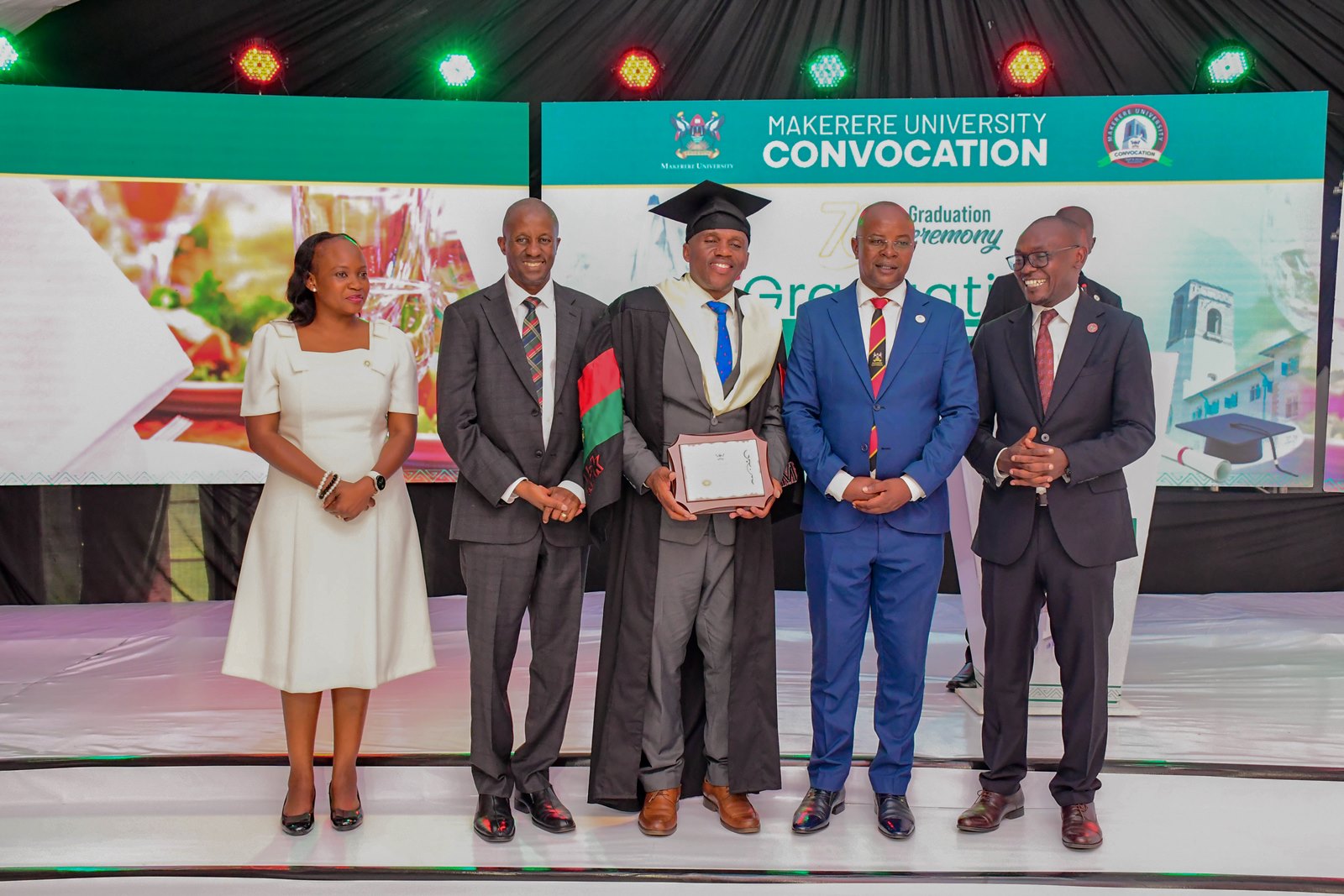
Recognizing excellence, EPRC presented the Young Professional award to Emmanuel Menya, the best Master of Arts in Economics graduate. The award includes a two-year employment contract. Ibrahim Kasirye, the Director of Research at EPRC presented the award on behalf of Dr. Sarah Ssewanyana, the Executive Director.
The EPRC Young Professional Award, recognizes and celebrates exemplary performance. The award underscores the importance of nurturing young professionals who exhibit excellence, innovation, and a strong commitment to national development.
Significance of the Award ceremony
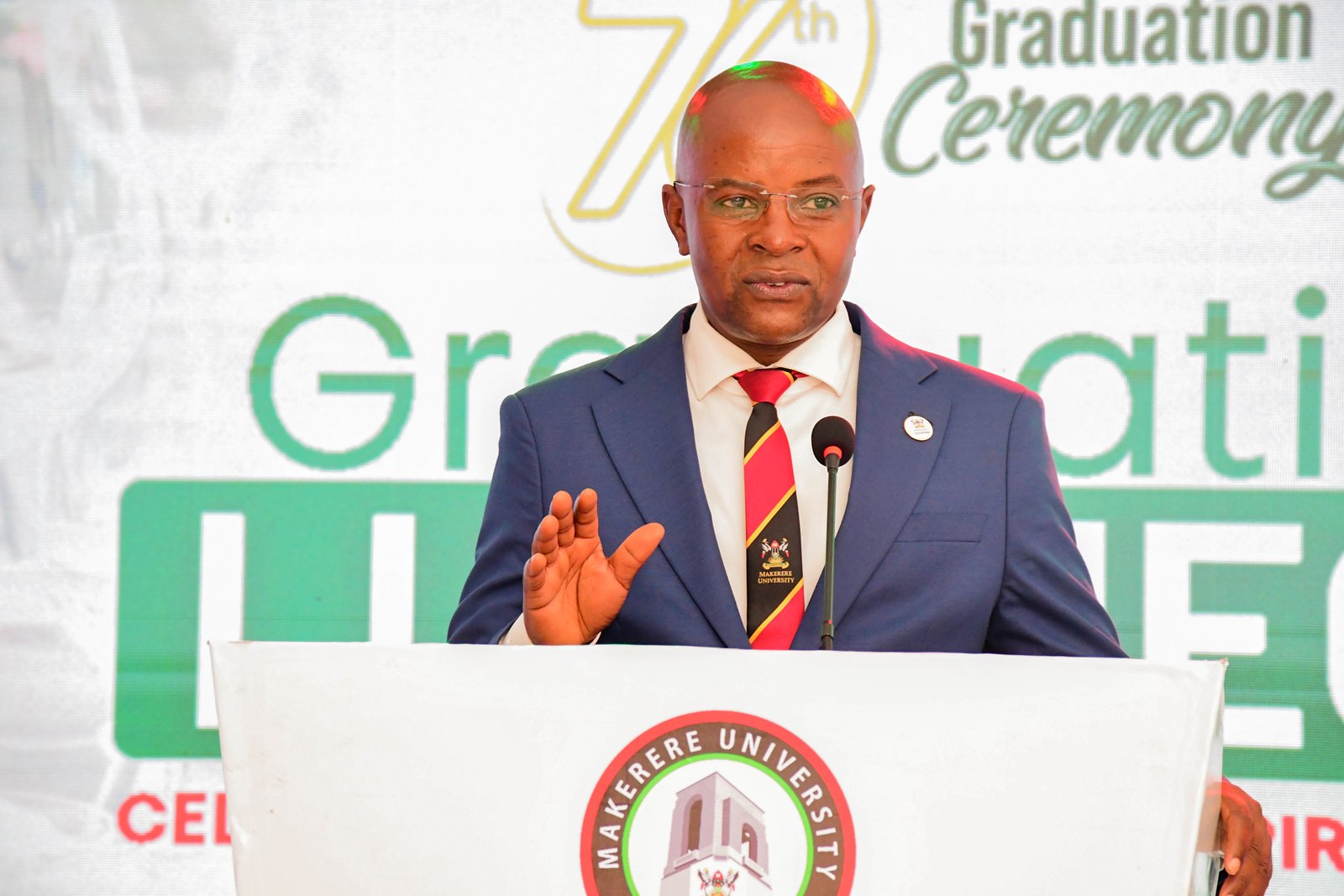
Prof. Edward Bbaale, Principal of College of Business and Management Sciences (CoBAMS), underscored the significance of the ceremony, noting that it served three key purposes: to recognize academic excellence among students, to honor faculty members excelling in teaching, research, and service, and to celebrate Prof. John Ddumba-Ssentamu, former Vice-Chancellor of Makerere University, for his continued contribution to scholarship through authorship.
Prof. Bbaale described Prof. Ddumba-Ssentamu’s ongoing scholarly work as inspirational, stating that it demonstrates a steadfast commitment to knowledge creation beyond leadership roles. He commended both students and staff for their hard work and discipline, emphasizing that university success is a shared achievement.
Collaboration, Responsibility, and Excellence
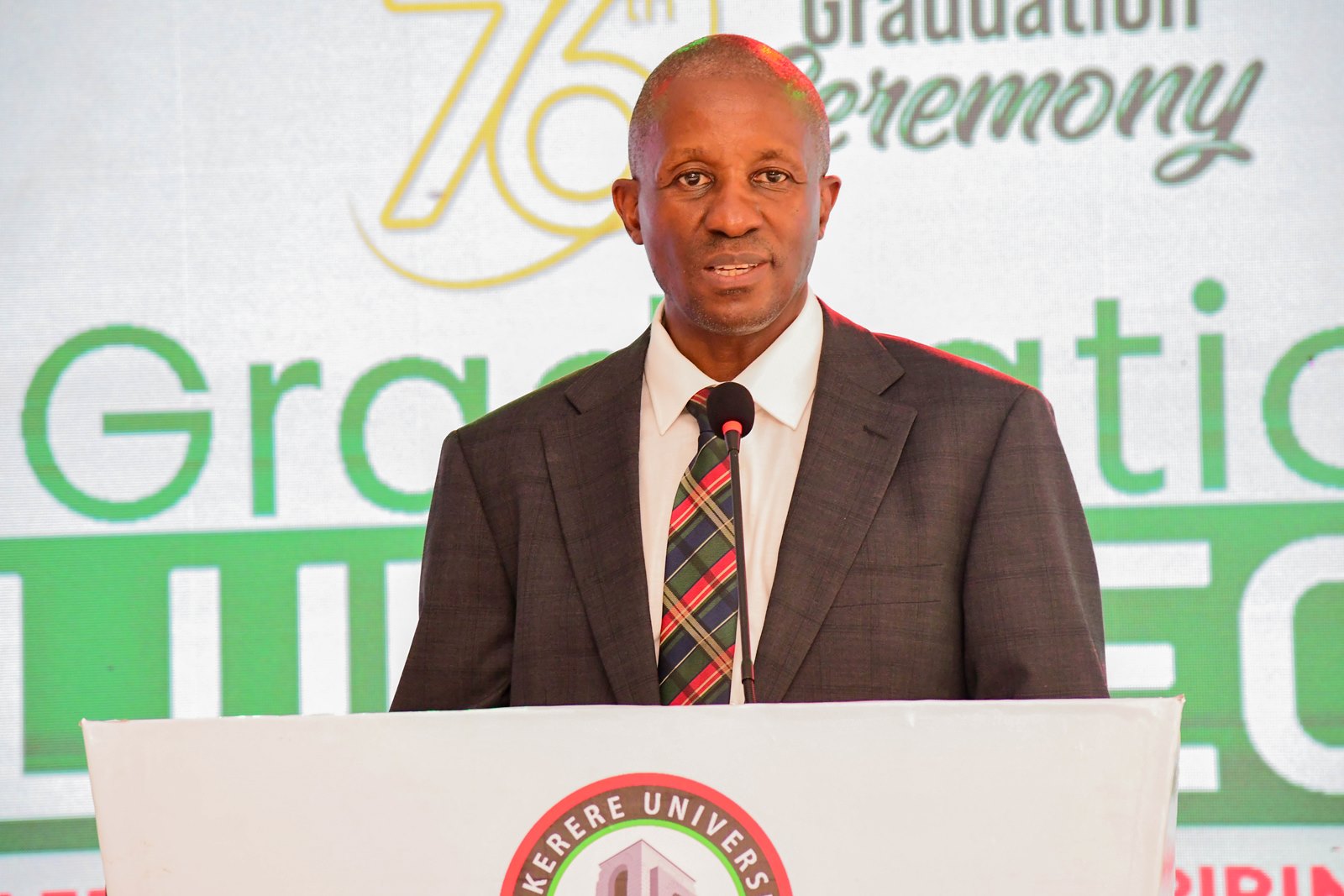
Congratulating the awardees, the Principal of Makerere University Business School (MUBS), Prof. Moses Muhwezi, reminded graduates that being a product of Makerere University is both a privilege and a responsibility.
“Uphold the university’s internationally respected brand, defend it, and take pride in it, while maintaining unity and avoiding internal conflicts that could harm its reputation,” he urged. The Principal of MUBS encouraged graduates to remain committed, diligent, and focused in their pursuit of excellence.
Highlights about Makerere University Convocation
CPA George Mugabi Turyamureeba, Chairperson of the Makerere University Convocation, informed the audience, that the Convocation is a legally established and influential platform for alumni and staff.
Rallying alumni and staff to join Makerere University Convocation, CPA Turyamureeba outlined the achievements and ongoing activities. He reported that during his tenure, the Convocation Executive, had expanded and beautified the permanent home for the Convocation. Some of the ongoing activities include: strengthening alumni engagement, introduction of a cross-generational mentorship program, and the formation of a cooperative society (SACCO) aimed at providing affordable loans and potentially establishing a bank.
He tipped the fresh graduates on resilience, continuous self-improvement, and lifelong learning, stressing the importance of staying connected to their alma mater and the Makerere University Convocation community.
He cautioned the graduates on emerging fraud risks, including digital scams, and fraudulent job offers. He urged them to safeguard their personal information, uphold integrity, and avoid becoming either victims or perpetrators of fraud.
Trending
-

 General12 hours ago
General12 hours agoCall for Applications: Diploma Holders under Government Sponsorship 2026/2027
-

 General12 hours ago
General12 hours agoAdvert: Admissions for Diploma/Degree Holders under Private Sponsorship 2026/27
-

 Humanities & Social Sciences1 week ago
Humanities & Social Sciences1 week agoMeet Najjuka Whitney, The Girl Who Missed Law and Found Her Voice
-

 General1 week ago
General1 week ago76th Graduation Highlights
-

 Agriculture & Environment2 weeks ago
Agriculture & Environment2 weeks agoUganda Martyrs Namugongo Students Turn Organic Waste into Soap in an Innovative School Project on Sustainable Waste Management
